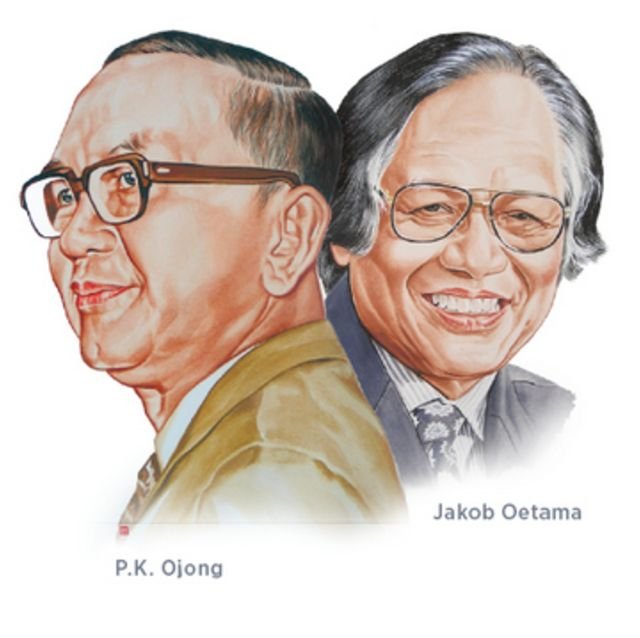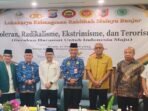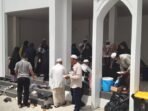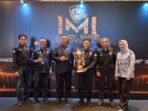Jakarta – Talking about these two press figures, it is difficult to tell them separately because during the leadership of the Kompas Daily, the two of them were always together.
Both of them are inspirational figures, suitable for role models by young press entrepreneurs.
Deputy Chief Editor of Kompas Daily Tri Agung Kritanto when invited to be the main speaker in welcoming the 4th Anniversary of the Indonesian Cyber Media Union (SMSI), on March 7, 2021 at the SMSI Jakarta Press Club Building, conveyed a glimpse of the exemplary and leadership style of Ojong-Jakob in managing Kompas Daily.
The story about Ojong-Jakob was presented at this event to be an inspiration for cyber press entrepreneurs who are members of SMSI.
The full names of the two press figures were Petrus Kanisius (PK) Ojong (1920- 1980). Ojong, was born in Bukit Tinggi, West Sumatra, July 25, 1920, his father was named Auw Jong Pauw, a tobacco trader in Payakumbuh. His mother is Njo Loan Eng Nio. His parents gave him the name Auw Ojong Peng Koen which later became PK Ojong.
Jakob was born in Jowahan Village, about 500 meters east of the grandest Borobudur temple in Magelang, Central Java. They met in Jakarta and together they founded Intisari Magazine and Kompas Daily.
They agreed to share their duties in leading the Kompas Daily. Ojong handled administration and business, Jakob Oetama (1931- 2020) handled the editorial sector.
Even though Ojong handled the press business, he couldn’t abandon his journalist instincts. He still occasionally writes the Editorial Plan, and manages the famous Kompasiana rubric, discussing various issues in the Kompas daily.
In the world of press companies, the business and editorial fields are equally important, although there is a kind of demarcation line between the two fields.
These two fields are in the hands of these two figures, Kompas is growing rapidly.
Ojong-Jakob is like two sides of a coin. The two of them walked in one swing, and both had teachers and journalists in their background.
Both of them do not like to appear, humble, honest, and do their best. The similarities between the two of them, bind themselves to establishing Intisari Magazine and Kompas Daily.
In 1940 after graduating from the Hollandsch Chineesche Kweekschook (HCK) teacher school in Jatinegara, Jakarta, Ojong became a Dutch-language elementary school teacher, namely Hollandsch Chineesche Broederschool St Johannes Berchmans on Mangga Besar Raya Street, West Jakarta (now Budi Mulia School).
Meanwhile, Jakob is also a history teacher at several schools in Jakarta while being an editor at Penabur Magazine.
Ojong in 1951 was already the Chief Editor of Star Weekly, and also at the Keng Po newspaper.
Star Weekly and Keng Po have their offices in an 11 x 5 meter room on the 2nd floor, Pintu Besar Selatan Street 86- 88, Jakarta.
In 1958, Jakob first met Ojong, who was then editor of Keng Po and Star Weekly. Jakob wants to study with Ojong.
However, the Weekly Star weekly was hurriedly banned on October 11, 1961 following Keng Po, who was earlier muzzled because he considered his criticism to be too harsh on the government.
From the next meeting, the two agreed to establish Intisari Magazine on August 17, 1963. It was not until two years since Intisari was established that the two of them founded Kompas Daily, June 28, 1965.
On the way to managing Intisari and Kompas, both of them shared their duties. They don’t like to appear. “But because I am in charge of editorial affairs, like or not, I have to appear,” said Jakob.
In Intisari and Kompas Daily, the two figures laid the foundation of idealism, upholding human and human values. Lay a philosophy in the development of the press company.
In recruiting journalists / employees, Ojong prioritizes “good character” rather than skills possessed by prospective employees.
As quoted in the book 50 Tahun Kompas Gramedia Developing Small Indonesia (Kompas Book Publisher, 2013), Jakob said, in hiring new employees or promotion to a higher level, always prioritizes good character, honest, simple, diligent, rational, initiative. , willing to accept other people’s opinions, balanced and fair in paying attention to subordinates, good at helping work for his assistants, and also good at supervising them. Intelligence, intelligence, and tenure are the next conditions
Skills shortages can be increased through training, education and courses.
Ojong and Jakob themselves have the character of living a simple life, humble, responsible and work thoroughly, and like to help. Jakob calls Ojong a charitable human.
P.K. Ojong believes in plain living, high thinking. The simplicity of Ojong and Jakob makes journalists / employees or those who are already officials at Kompas Daily not dare to buy or bring to the offices of famous branded cars as symbols of luxury.
So it is difficult to find a particular car brand that is a symbol of luxury in the parking lot at Kompas, except for the guest car.
Even so, Ojong always thinks about the fate of his employees.
“Employees invest their lives in the company. So companies also have to think about guaranteeing their old age, ”said Ojong.
In ensuring the future of employees, the leader of Kompas has expanded his business to the Gramedia publisher and bookstore, and the hospitality world which is named Santika. The goal is that if Kompas is muzzled, employees will still have a place to work.
There is an important message from Ojong for company managers. According to him, a good company is a company that can guarantee the welfare of its employees, in addition to companies whose leaders are not onmisbaar.
“This means that if the leaders are no longer there, the company must be able to run without them. So it is necessary to develop a system to make this possible, and form cadres to replace the old leaders, ” wrote Helen Ishwara explaining in the book. (**)
anang









